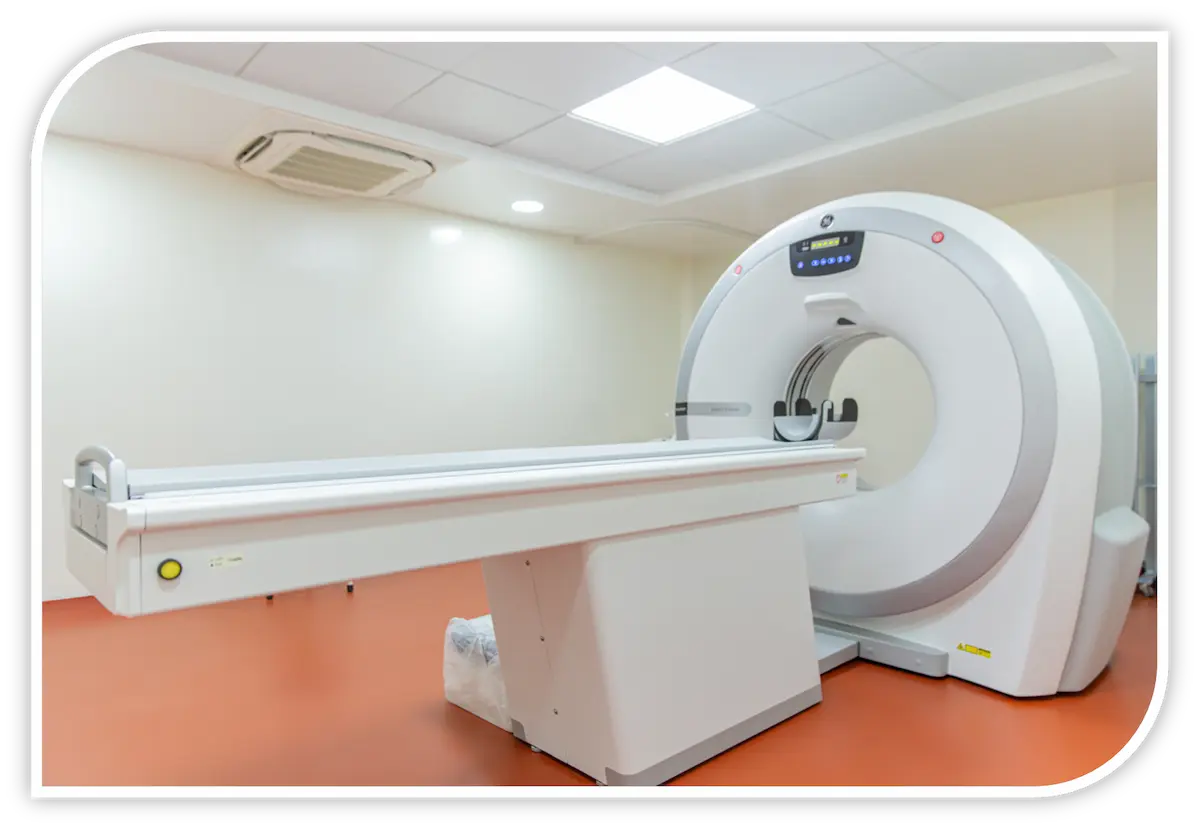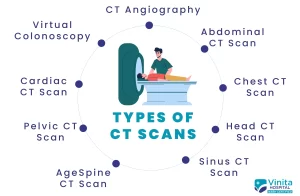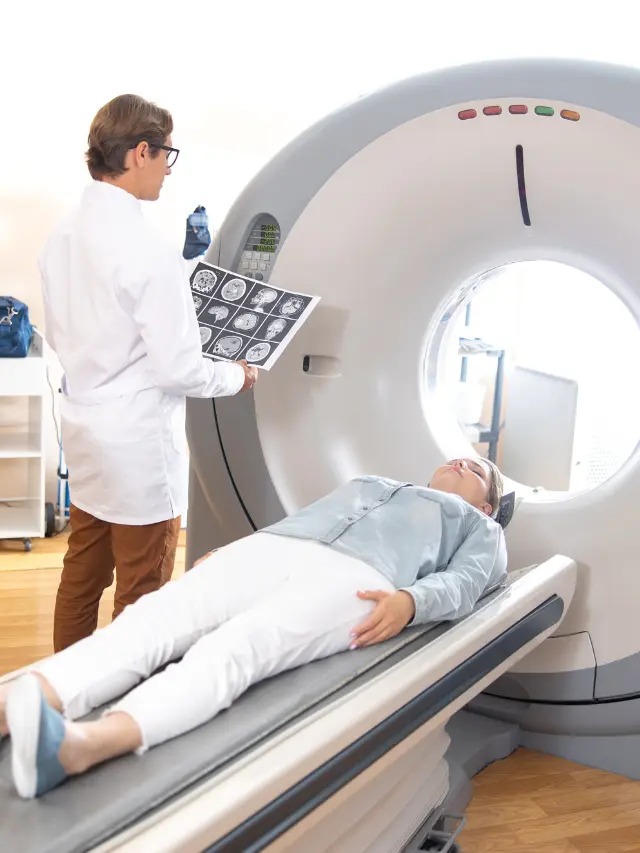CT Scan & X-Ray

Overview
Types
Benefits
Facilities
Doctors & Specialties
The department of radiology and imaging at Vinita Hospital plays a vital role across all our specialties. We provide the best CT scan in Chennai with highly specialized care to patients who require cutting-edge diagnostic or image-guided therapies. Our expert specialists work with doctors and surgeons across specialties to arrive at extremely precise diagnoses.
We are committed to performing patient examinations at the lowest radiation exposure essential to create images that answer the questions your healthcare provider is asking. In pediatric radiology, our examinations are tailored to the size of the patient, from the newborn to the adolescent with significant improvements in our patient care infrastructure.
CT Scan in Chennai
Computed tomography, also known as a CT or CAT scan, is a diagnostic medical imaging test. Similar to traditional x-rays, it produces multiple pictures or images of the inside of the body or the internal organs, soft tissues, bones, and blood vessels with greater detail.
A CT scan can even generate three-dimensional images that your physician can review these images on a computer monitor. It can more easily diagnose problems such as cardiovascular disease, infectious disease, appendicitis, cancer, trauma, and musculoskeletal disorders.
X-Ray
X-rays use invisible electromagnetic energy beams to capture images of soft tissues, bones, and organs on film. Standard X-rays are performed for varied reasons to diagnose tumors or bone injuries. Usually, X-rays are used to detect problems like bone fractures and breaks, scoliosis, lung problems, tooth problems, dysphagia (swallowing problems), heart problems, non-cancerous and cancerous bone tumours, breast cancer, etc.
The type of CT scans your doctor suggests usually depends in the large part on the body area they want to evaluate. Some kinds of CT scan in Chennai include,
- CT angiography
- CT bone scan
- CT abdomen scan
- CT scan of chest/lungs
- Cardiac CT
- Head CT
- CT neck
- CT scan of kidneys
- Pelvic CT scan
- CT scan of the spine
Several types of X-rays capture pictures of different areas inside your body. The doctors may order for an X-ray depending on the body area to be examined at different angles. The common types of X-rays include,
- Abdominal X-ray
- Chest X-ray
- Bone X-ray
- Extremity X-ray
- Barium X-ray
- Hand X-ray
- Joint X-ray
- Dental X-ray

There are various benefits of taking a CT scan and X-ray in Chennai.
- CT scanning is non-invasive, painless, and accurate.
- A major advantage of a CT scan is its ability to image soft tissue, bone, and blood vessels all at the same time.
- The techniques used for X-ray and CT scans are fast and simple. In emergency cases, it is used to reveal internal injuries and bleeding to help save lives.
- CT scan in Chennai is less sensitive to patient movement than MRI.
- It is used to examine patients with injuries from trauma such as a motorbike accident.
- CT imaging provides real-time imaging and is a good tool for guiding needle biopsies and needle aspirations. This is particularly true for procedures involving the abdomen, lungs, pelvis, and bones.
- The X-ray cost in Chennai is cheap compared to the other diagnostic tests.
- A diagnosis via CT scan or X-ray will eliminate the need for surgeries.
- No radiation remains in the body of a patient after a CT exam.
- The x-ray used for the CT scan in Chennai does not have immediate side effects.
- Both CT scans and X-rays are often used in pediatric patients to evaluate lymphoma, kidney tumours, neuroblastoma, cystic fibrosis, congenital malformations of the heart, blood vessels and kidneys, complications of pneumonia, acute appendicitis, inflammatory bowel disease, and severe injuries.
- In case of any foreign objects present inside or around your bones, an X-ray will help your doctors detect them and make them provide proper treatment.
- Also, it plays a significant role in the detection, diagnosis, and treatment of vascular diseases with an affordable CT scan cost in Chennai.
- Comprehensive services under one roof: We specialized in performing all types of CT scans and x-ray procedures with utmost precision and professionalism.
- State-of-the-art lab facilities: Our sophisticated digital radiography systems are powered by advanced technology to provide more detailed and accurate digital images. The x-ray machines are medically approved to be safe, precise, and of high quality.
- Trained professionals: We are the most trusted choice for CT scan in Chennai having a team of trained experts who can perform the test safely and reliably.
- Quick reporting: We use digital radiology technology to enable us to provide the report in a quick span of time. The radiologist can view the images instantly and provide accurate reporting. The same can be shared with your healthcare provider for a faster and better diagnosis.
- High levels of patient care: Cutting-edge diagnostic center facilities, & hygienic & clean environment, excellent customer care, and friendly staff.
- Best prices: We provide affordable x-ray cost in Chennai without compromising on our quality and professionalism.
Our top-notch specialists at Vinita Hospital provide the best CT scan in Chennai with high-quality and unparalleled patient care. We have proven expertise in handling even the most complicated cases precisely and accurately. Also, we follow strict protocols for infection control in order to prevent complications making the whole process comfortable besides providing an affordable CT scan cost in Chennai.
Overview
Types
Benefits
Facilities
Doctors & Specialties
Frequently Asked Questions
The number of CT scans a person may need depends on their individual medical condition and the healthcare provider’s recommendations. CT scans use ionizing radiation, which can increase the risk of cancer, so healthcare providers will carefully weigh the risks and benefits of each scan before ordering it.
Although CT scans are generally considered safe and effective, there are some potential side effects and risks associated with the procedure. Some of the most common side effects include:
- Radiation exposure
- Allergic reaction
- Nausea or vomiting
- Kidney damage
- Other risks
While CT scans are generally considered safe and effective, there are several disadvantages or limitations to this imaging modality:
- Radiation exposure: As mentioned earlier, CT scans use ionizing radiation, which can increase the risk of cancer. While the radiation dose is typically low and the benefits of the scan often outweigh the risks, frequent or unnecessary CT scans may pose a long-term risk for some patients.
- Contrast material: CT scans sometimes require the use of contrast material, which can cause an allergic reaction in some people, particularly those with a history of allergies to contrast material or shellfish.
MRI (Magnetic Resonance Imaging) and CT (Computed Tomography) scans are both valuable imaging techniques, but they have different strengths and applications. The choice between MRI and CT depends on the specific clinical situation and the information needed by healthcare providers.
MRI is generally considered superior for soft tissue imaging and provides detailed images of organs, muscles, tendons, ligaments, and the central nervous system. It is particularly useful for diagnosing conditions such as brain and spinal cord disorders, joint and musculoskeletal issues, tumors, and certain cardiovascular conditions.
CT (Computed Tomography) scans, like any medical procedure, carry both benefits and potential risks. It’s important to consider the specific circumstances and weigh the benefits against the risks. Here are some factors to consider regarding CT scans and their impact on health:
Benefits of CT Scans:
-
Diagnostic Accuracy: CT scans provide detailed cross-sectional images of the body, allowing healthcare providers to detect and diagnose various conditions with high accuracy. They can help identify fractures, tumors, infections, and other abnormalities.
-
Rapid Imaging: CT scans are relatively quick and can provide immediate results, allowing for timely diagnosis and treatment decisions.
Risks and Considerations:
-
Ionizing Radiation: CT scans use ionizing radiation, which can pose a small potential risk of radiation-related complications, particularly with repeated or frequent scans. However, modern CT scanners are designed to minimize radiation exposure, and the benefits of the scan often outweigh the associated risks.
-
Contrast Agents: In some cases, a contrast dye may be used during a CT scan to enhance the visibility of certain structures or abnormalities. While generally safe, some individuals may have an allergic reaction or adverse side effects to the contrast agent.


